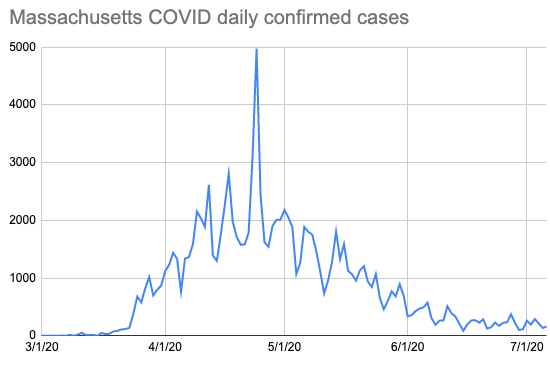Partially Stepping Down Isolation |
July 8th, 2020 |
| covid-19 |
The other indicators are also good: testing is way up, hospitalizations and intubations are way down, and the fraction of tests that are positive is below 2%.
Our house has decided to step down our isolation somewhat, while still being pretty careful:
Our default is the same as before: you can only interact with other people outside the household if you're outside, masked, and at least six feet apart.
Getting closer than that with people who have had COVID and tested positive for antibodies with a reliable test is generally ok, as long as you've shared details of their illness and test results with the house. We don't know for sure that they can't get it again soon, but it seems unlikely enough to us that we're willing to take that risk.
Additionally, each of us can be closer to one person per week outside the household. When we do, we'll put a note with their name in the
#visit-logchannel in the house Slack. This means that if we later learn that someone's been exposed we can trace contacts and know who to warn. The week rolls over on Monday, and you can see that person multiple times during the week. Being close to someone is unrestricted; you can kiss etc.If you are outdoors and wearing masks, interacting with someone at under 6ft but at least than 1ft counts as half a person. For example, if I wanted to go sailing on a small boat with two people outside my household, that could be my interaction for the week.
Going inside counts as being close to all the people who've breathed that air since it last changed over. If you're visiting someone who lives in a shared house, you'd go immediately to their room, ideally holding your breath. Using the bathroom at their house would be ok if the fan ran for 15min before (and after, out of consideration for their housemates).
Guests mostly can't come to our house. The exception is if you have an exterior door into your space, or if they've already had COVID and the house has agreed.
The house has to agree about any exceptions. For example I have an in-person doctor's appointment this morning for my wrists, and I talked with housemates about timing and what precautions to take.
If the improvement in MA reverses or anyone we've been in contact with seems like they might have COVID, we'll put this on hold.
I know other households that have been using a closed bubble approach, but while I think that approach can work it's not a good fit for us. We have multiple housemates who would like to spend time with people outside the household, and there isn't a perimeter that would work. Additionally, we're much more wary of going indoors than the people we would potentially be bubbling with; most of them are still going into grocery stores.
- Food Spending During Covid
- Exposure or Contacts?
- Increasing Isolation Again
- Vaccination and House Rules
- Personal Response to Omicron
Comment via: facebook, lesswrong, hacker news, substack
